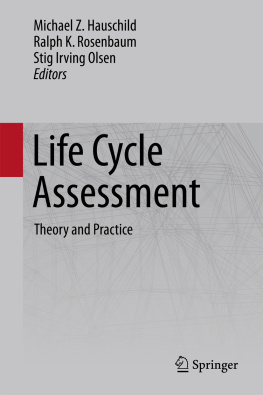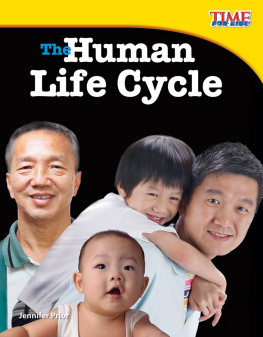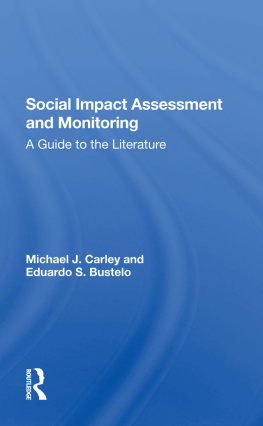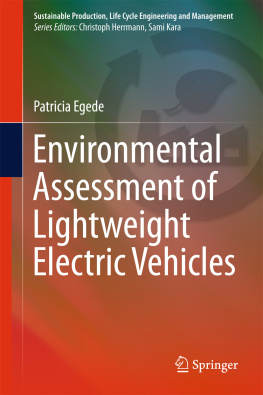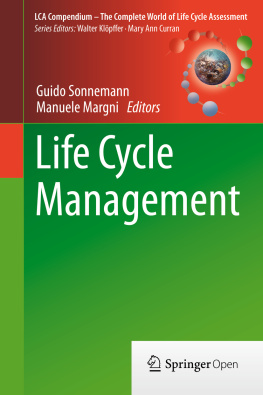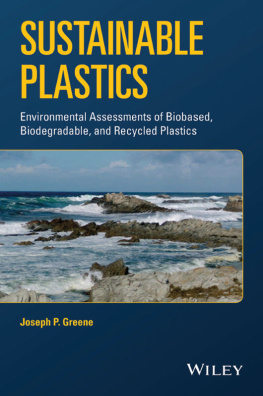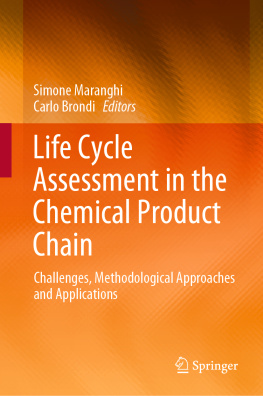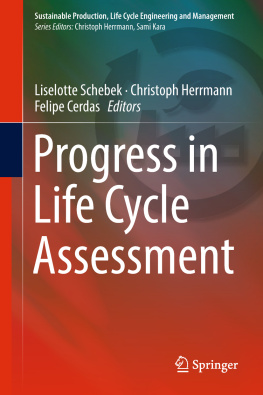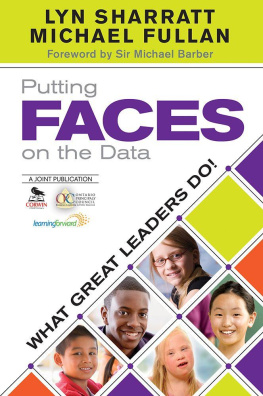Michael Z. Hauschild - Life Cycle Assessment
Here you can read online Michael Z. Hauschild - Life Cycle Assessment full text of the book (entire story) in english for free. Download pdf and epub, get meaning, cover and reviews about this ebook. year: 0, publisher: Springer International Publishing, genre: Romance novel. Description of the work, (preface) as well as reviews are available. Best literature library LitArk.com created for fans of good reading and offers a wide selection of genres:
Romance novel
Science fiction
Adventure
Detective
Science
History
Home and family
Prose
Art
Politics
Computer
Non-fiction
Religion
Business
Children
Humor
Choose a favorite category and find really read worthwhile books. Enjoy immersion in the world of imagination, feel the emotions of the characters or learn something new for yourself, make an fascinating discovery.
- Book:Life Cycle Assessment
- Author:
- Publisher:Springer International Publishing
- Genre:
- Year:0
- Rating:5 / 5
- Favourites:Add to favourites
- Your mark:
- 100
- 1
- 2
- 3
- 4
- 5
Life Cycle Assessment: summary, description and annotation
We offer to read an annotation, description, summary or preface (depends on what the author of the book "Life Cycle Assessment" wrote himself). If you haven't found the necessary information about the book — write in the comments, we will try to find it.
Life Cycle Assessment — read online for free the complete book (whole text) full work
Below is the text of the book, divided by pages. System saving the place of the last page read, allows you to conveniently read the book "Life Cycle Assessment" online for free, without having to search again every time where you left off. Put a bookmark, and you can go to the page where you finished reading at any time.
Font size:
Interval:
Bookmark:
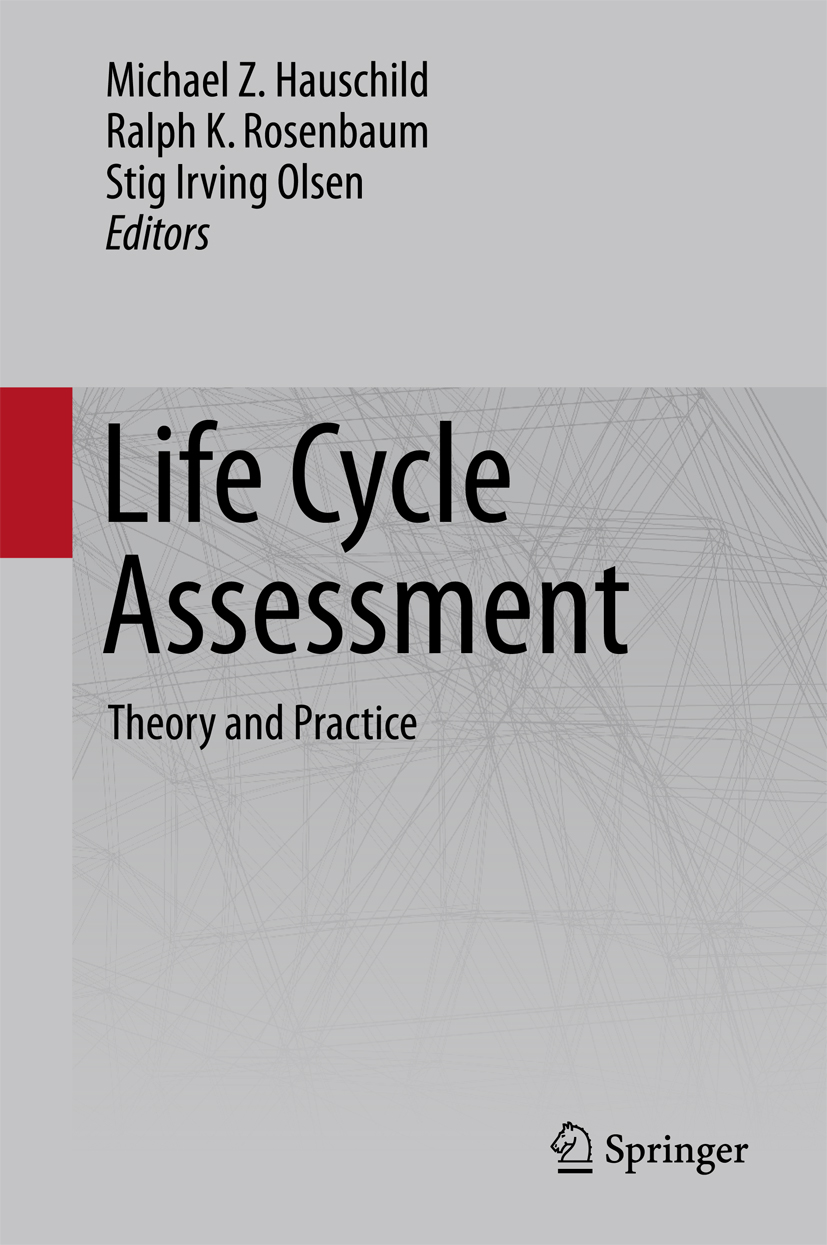

This Springer imprint is published by Springer Nature
The registered company is Springer International Publishing AG
The registered company address is: Gewerbestrasse 11, 6330 Cham, Switzerland
It is an old observation that What gets measured gets managed, and that what is not measured or measurable runs the risk of being neglected. It is therefore important that we have tools for assessing the sustainability of our choices when we develop the technologies and systems that shall help us determine and meet the needs of the present generations in a way that does not compromise the ability of our descendants to meet their needs in the future.
As you will learn from this book, we must take a life cycle perspective when we want to assess the sustainability of the solutions that lie in front of us. You will be presented with many examples of problem shifting where solutions that improve or solve a targeted problem unintentionally create other problems of environmental, economic or social nature somewhere else in the systems of processes and stakeholders affected by our choice. If we do not consider the totality of these systems in our analysis, we will fail to notice these unwanted consequences of our decision and we will not be able to take them into consideration. We also have to consider a broad range of potential impacts in our assessment, in fact all those is that the system can contribute to and that we consider relevant in the context of our decision-situation.
Life Cycle Assessment, LCA, offers this totalityit analyses the whole life cycle of the system or product that is the object of the study and it covers a broad range of impacts for which it attempts to perform a quantitative assessment. The focus of LCA has mainly been on the environmental impacts although both social and economic impacts can be included as well. It is an important assessment tool as demonstrated by the central role that it has been given in the environmental regulation in many parts of the world and certified by its ISO standardization and the strong increase in its use over the last decades by companies from all trades and all over the world.
Engineers and scientists who develop decision support, or make decisions where sustainability is a concern, should understand the need to view the solutions in a life cycle perspective and to consider possible trade-offs between environmental impacts and between the three sustainability dimensions. Designers and engineers who design and develop products and technical systems should be able to critically read and evaluate life cycle assessment information about the alternatives that they are considering, and the environmental sustainability specialists among them should also be able to perform the LCA studies.
A textbook, explaining the LCA methodology and the theory behind it in a pedagogical way with a meaningful balance between depth and accessibility
A cookbook offering recipes with concrete actions needed to perform an LCA
A repository of information about experience with the use and adaptation of LCA and LCA-based approaches within policy-making, decision support and life cycle engineering and management, and a collection of chapters presenting results and methodological challenges from the use of LCA in some of the central technological application areas of LCA
Focus is on environmental impacts but life cycle sustainability assessment is considered through introductory chapters on social LCA and on life cycle costing.
University students, from undergraduate to Ph.D. level
Researchers and (university) teachers
Professionals looking to get started on LCA and quantitative (environmental) sustainability assessment
LCA practitioners looking to deepen their knowledge of specific aspects of LCA methodology (e.g. uncertainty management) and LCA practice in specific areas (e.g. electro-mobility, buildings, biomaterials, etc.) and looking for relevant literature for further reading.
The structure of the book with separate and comprehensive parts on LCA methodology (theory), LCA cookbook (own practice) and LCA applications (practice of others) allows it to cater to the needs of this rather broad group of potential users.
A total of 68 authors contributed to the writing of this book (see short presentations of contributors at the end of each chapter). The core team consisted of researchers from the division for Quantitative Sustainability Assessment at the Department of Management Engineering at the Technical University of Denmark, where the three editors have or have had their employment (Ralph Rosenbaum now is an Industrial Chair for Environmental and Social Sustainability Assessment at the French National Research Institute of Science and Technology for Environment and Agriculture (Irstea) in Montpellier, France). Other contributions were solicited from leading experts within each field from the rest of the world, in particular for discussion of the different applications of LCA.
Font size:
Interval:
Bookmark:
Similar books «Life Cycle Assessment»
Look at similar books to Life Cycle Assessment. We have selected literature similar in name and meaning in the hope of providing readers with more options to find new, interesting, not yet read works.
Discussion, reviews of the book Life Cycle Assessment and just readers' own opinions. Leave your comments, write what you think about the work, its meaning or the main characters. Specify what exactly you liked and what you didn't like, and why you think so.

